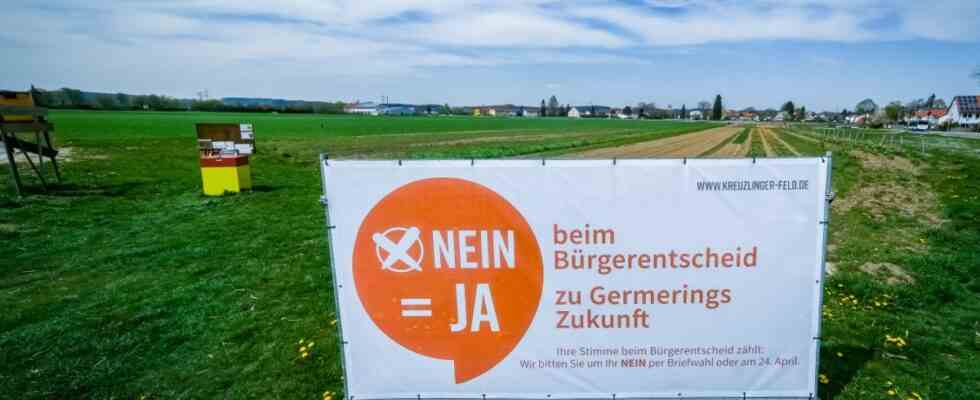The citizens’ initiative Livable Germering has achieved a great success: Their petition for the development of the Kreuzlinger Feld was accepted with 60.7 percent of the votes. Voter turnout was just under 44.5 percent. 13,406 of the 30,138 Germeringer voters cast their votes, the vast majority by postal vote. The fact that all those eligible to vote were automatically sent the postal voting documents probably contributed to the high turnout. 8,105 voters voted yes; the necessary quorum of around 6000 yes votes was easily reached.
The referendum corresponds to a city council resolution that the mayor and the administration have to implement. “I’m obliged to do that, and I will do that,” said Mayor Andreas Haas on Sunday evening. The ongoing planning process has been stopped. He estimates that it will take four to five years before a final development plan is in place. Therefore, the city must now adapt its school planning. A school is also to be built on Kreuzlinger Feld – not just for the boys and girls who could one day live there. Until then, the children have to be taught elsewhere.
According to Haas, various offices will be entrusted with implementing the decision. He also sees the citizens’ initiative as having a duty to get involved. The members of the BI “Liveable Germering” celebrate the result on Sunday evening. BI spokesman Thomas Langnickel speaks of “great joy and relief” and thanks all supporters.
The citizens’ initiative Livable Germering: Achim Pusch (from left), Rudolf Kauper, Tina Reitberger and Stefan Beutler are happy about their success.
(Photo: Thomas Langnickel/oh)
“Now is the time to look ahead.” It is important to prepare the architectural competition and public dialogue. “We want to address all the issues from the question.” After that, an open urban development ideas competition is to be held, permanently affordable living space is to be created, the new buildings are to be adapted to the existing development, climate change is to be “seriously” taken into account and additional traffic is to be minimized. Citizens should be involved “effectively”.
“We would have liked a different result,” says Oliver Simon, the local and parliamentary group leader of the Germeringer CSU. The CSU had campaigned for a no in the decision. “We firmly believe that we have created a good plan to get the much-needed housing and elementary school.” Apparently, the majority of voters see things differently.
On Sunday they trickle into the town hall to cast their vote. Only 362 prefer voting at the ballot box to postal voting. Many parents of younger children are among them, as well as some married couples of retirement age. Most of those who provide information agree with yes, no matter in which part of Germering they live. And they thought a lot about it.
Most fear traffic chaos “because the traffic is already bursting at the seams.” They want fewer than the maximum of 600 apartments planned so far to be built, and they want a “reasonable traffic concept,” as a couple, 50 and 48, from Harthaus says. A family with a three-year-old daughter who lives near the construction area fears for the children who cycle to school. “The cycle paths have to be planned in a way that makes sense for the children,” they say. They all vote yes.
A 42-year-old from Harthaus says he discussed the decision a lot. Now he has voted yes. He rejected the idea of not cultivating the field at all, because it is important that apartments are built. Perhaps, he thinks, one could build cooperatively. “There would be enough people who would take part.” Something else bothered him: “The election campaign wasn’t conducted fairly” – because of the financial resources of the investors.
A 77-year-old points out an aspect that is not addressed: the people in the new apartments must also be supplied with drinking water. “We’re going to run out of water. Nobody thinks about that,” he grumbles. A couple from Salzstrasse, 36 and 40 years old, fears that investors could create even less affordable housing if the plans are rescheduled and therefore voted no. “The poor are excluded.”
First you have to plan again. Everyone involved wants to tackle this quickly. CSU faction leader Simon points out that the procedure will cost a lot of money. And he hopes that the city council will return to the “good, trusting cooperation” that Germering is known for.

